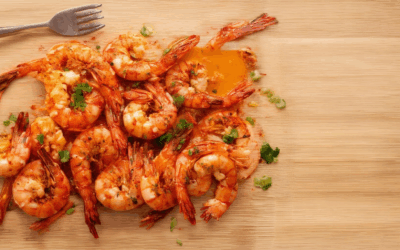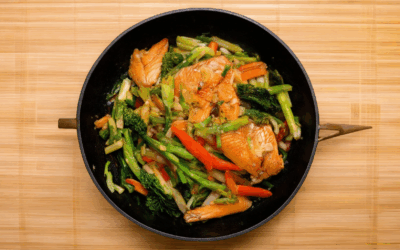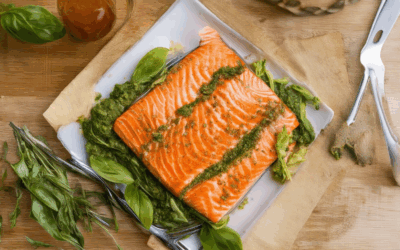Elevate your tilapia dinners with the perfect blend of lemon butter sauce, transforming simple meals into flavorful experiences. Whether you’re a seasoned cook or new to the kitchen, tilapia offers a versatile base for creating delicious dishes. From baked tilapia with lemon butter to pan-seared tilapia with garlic butter, there’s a recipe to suit every taste preference. Discover expert tips on achieving the ideal texture, pairing herbs that complement the natural flavor of tilapia, and exploring alternative dipping sauces like honey mustard or aioli. This guide dives into what makes tilapia taste better, offering step-by-step guides for cooking methods, and delves into seasoning combinations that elevate your dish. Don’t miss out on the best tilapia recipes featuring lemon cream sauce or parmesan crusts. With these tips, your tilapia dinners will never feel ordinary again.
Key Takeaways
– Elevate your tilapia dinners with a variety of seasonings like garlic, lemon, herbs, and bold spices for a flavorful boost.
– Opt for oven cooking for a healthier, low-oil option with consistent results, or pan-cook for a crispy exterior and rich flavor.
– Enhance your dish with herbs like dill, parsley, mint, basil, rosemary, thyme, cilantro, and fennel to complement the zesty acidity of lemon.

What Makes Tilapia Taste Better?
To enhance the flavor of tilapia, consider these expert tips:
- Seasoning Combinations : Use a mix of zesty acids like lemon juice or lime juice, aromatic herbs such as dill, parsley, and cilantro, and savory spices like garlic powder, paprika, and thyme. These ingredients work synergistically to elevate the fish’s natural taste.
- Fresh Herbs : Incorporate fresh herbs like dill, parsley, or basil for a burst of flavor. These herbs add brightness and freshness, complementing the mild profile of tilapia.
- Garlic and Lemon Zest : Garlic adds depth and complexity, while lemon zest provides a tangy note that balances the richness of the fish.
- Culinary Techniques : Opt for grilling, baking, or pan-searing to bring out tilapia’s natural sweetness. Overcooking can dry it out, so cook until just opaque and flaky.
- Serving Suggestions : Serve with a crisp white wine or a light citrus-infused sauce to enhance the dining experience.
By experimenting with these techniques and seasonings, you can transform tilapia into a flavorful dish that shines on any menu.
How to Make Lemon Butter Fish
Follow these simple steps to create a delicious lemon butter fish dish:
- Ingredients:
• 4 salmon fillets (about 6 oz each)
• 2 tablespoons unsalted butter
• 2 lemons (zest and juice)
• 1/4 cup white wine (optional)
• 1 teaspoon garlic powder
• 1 teaspoon paprika
• Salt and pepper to taste
• Fresh parsley for garnish - Instructions:
1. Preheat oven to 400°F (200°C).
2. In a small saucepan, melt butter over medium heat. Add lemon zest and juice, stirring until slightly thickened.
3. Season salmon fillets with salt and pepper. Arrange in a baking dish.
4. Pour lemon butter sauce over the salmon, ensuring even coverage.
5. Sprinkle garlic powder and paprika over the fillets.
6. Bake for 15-20 minutes, or until fish is cooked through and flakes easily with a fork.
7. Remove from oven and drizzle with additional lemon butter sauce if needed.
8. Garnish with fresh parsley before serving. - Serving Suggestions:
• Serve over rice or with a side of garlic bread.
• Optional: Add a touch of white wine to the sauce for extra flavor.
Enjoy your perfectly cooked lemon butter fish, rich with tangy flavor and tender texture!

What Sauce Goes Well with Tilapia?
- Garlic Butter Sauce: A simple and versatile option, perfect for grilling or sautéing. It enhances the mild flavor of tilapia with buttery richness and a hint of lemon.
- Lemon Butter Sauce: Similar to garlic butter but with added lemon zest and capers for a tangier twist, ideal for those who love citrusy flavors.
- Teriyaki Sauce: Sweet and savory, this Japanese-inspired sauce works well for grilled tilapia, offering a glaze-like finish.
- Hollandaise Sauce: Rich and creamy, this sauce is perfect for a luxurious dining experience, especially when served over baked tilapia with sides like vegetables or potatoes.
- Cilantro Lime Sauce: Fresh and zesty, this sauce adds a vibrant touch, making it excellent for a light meal with rice or beans.
- BBQ Sauce: Sweet and smoky, it’s a great choice for grilled tilapia, complementing it beautifully with a side of coleslaw or corn on the cob.
- Tartar Sauce: A classic choice, this tangy sauce pairs well with fried tilapia, offering a nice contrast to the fish’s texture.
- Mango Habanero Sauce: Spicy and fruity, this sauce adds a bold flavor, perfect for those who enjoy a bit of heat with their meal.

Good Seasoning for Tilapia
Tilapia, known for its mild flavor, can be enhanced with a variety of seasonings. Here are some excellent options:
- Garlic, Lemon, and Herbs: A classic combination featuring olive oil, minced garlic, lemon juice, and herbs like thyme or oregano. This option is simple and versatile.
- Old Bay Seasoning: A popular choice for a spicy kick, it includes paprika, cayenne, and other bold spices, making it ideal for those who enjoy a bit of heat.
- Blackening Seasoning: Perfect for grilling, this blend typically includes cumin, chili powder, and sugar, offering a smoky and slightly sweet flavor.
- African-Inspired Spices: Try using curry powder, turmeric, or fenugreek for a traditional African twist, adding depth and complexity to the dish.
- Basic Salt and Pepper: Essential for any cooking session, these are perfect for a straightforward seasoning.
- Dill or Parsley: Add a touch of freshness with these herbs for a brighter taste.
- Teriyaki Sauce: For a sweeter profile, consider using teriyaki sauce as part of your seasoning blend.
These seasonings can be applied by rubbing them directly onto the fish or marinating them for a more intense flavor. Choose based on your preference for a quick meal or an adventurous twist.
Is It Better to Cook Tilapia in the Oven or Pan?
When deciding whether to cook tilapia in the oven or pan, several factors come into play:
- Oven Cooking:
- Pros:
- Even heating ensures consistent cooking.
- Less oil needed compared to pan-frying.
- Healthier option due to minimal added fats.
- Cons:
- Might lack the sear or caramelization achieved in a pan.
- Requires precise temperature control to avoid drying out.
- Pros:
- Pan Cooking:
- Pros:
- Delivers a crispy exterior and rich flavor.
- Great for sautéing vegetables alongside the fish.
- Cons:
- May require more oil for frying or grilling.
- Can lead to a greasier dish if not managed properly.
- Pros:
Which Method to Choose?:
- Opt for oven cooking if you’re aiming for a healthier, low-oil option with consistent results.
- Pan-cook for a flavorful sear and the ability to prepare sides like vegetables simultaneously.
Both methods are excellent, so the choice depends on your preferences and kitchen setup. Whether you bake or pan-fry, tilapia remains a versatile and delicious fish to cook!

Herbs That Pair Well with Fish and Lemon
The combination of fish and lemon is a delightful match, as the bright acidity of lemon complements the delicate flavors of fish. Here are some herbs that work exceptionally well with this pairing:
- Dill : A classic choice, particularly for fatty fish like salmon, where its fresh, slightly sweet flavor balances the richness.
- Parsley : Often used as a garnish, it adds a refreshing, herbal note that enhances the lemon’s brightness.
- Mint : Ideal for dishes with a Mediterranean influence, it provides a cooling contrast to the acidity of lemon.
- Basil : Offers an earthy complexity, making it a versatile option for various fish dishes.
- Rosemary : Its aromatic qualities enhance the flavor of fish, especially when grilled or roasted.
- Thyme : Subtle and aromatic, it works well with both mild and robust fish varieties.
- Cilantro : Provides a citrusy kick, perfect for fusion dishes or fish tacos.
- Fennel : Adds a unique, slightly sweet flavor that complements the tanginess of lemon.
These herbs can be used in various ways – as a rub, in a marinade, or as a finishing touch – to elevate your fish dishes. Whether you’re grilling, baking, or sautéing, these herbs will bring a burst of flavor that pairs beautifully with the zesty acidity of lemon.




0 Comments